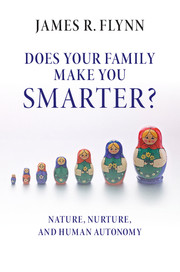Book contents
- Frontmatter
- Dedication
- Epigraph
- Contents
- List of figures, tables and boxes
- Acknowledgments
- Part I Human autonomy
- Part II Intelligence
- 7 The Raven's revolution
- 8 Learning from astronomy
- 9 The meta-theory of intelligence
- 10 Scientific theories of intelligence
- 11 Psychology and Cardinal Bellarmine
- For scholars who wish to use the Age-Table Method to measure family effects in nations other than the USA
- Appendix I Wechsler Vocabulary and description of method of analysis
- Appendix II Stanford-Binet Vocabulary
- Appendix III Raven's Progressive Matrices
- References
- Name index
- Subject index
11 - Psychology and Cardinal Bellarmine
from Part II - Intelligence
Published online by Cambridge University Press: 05 June 2016
- Frontmatter
- Dedication
- Epigraph
- Contents
- List of figures, tables and boxes
- Acknowledgments
- Part I Human autonomy
- Part II Intelligence
- 7 The Raven's revolution
- 8 Learning from astronomy
- 9 The meta-theory of intelligence
- 10 Scientific theories of intelligence
- 11 Psychology and Cardinal Bellarmine
- For scholars who wish to use the Age-Table Method to measure family effects in nations other than the USA
- Appendix I Wechsler Vocabulary and description of method of analysis
- Appendix II Stanford-Binet Vocabulary
- Appendix III Raven's Progressive Matrices
- References
- Name index
- Subject index
Summary
What I have to say at the end is worth only a page. The science of psychology shows that those who are pre-scientific in their worldview must think again. They must all recognize that science is the best instrument to explore the real world, including the real world of human behavior, and that “common sense” cannot compete. However, I sympathize with Cardinal Bellarmine in his advice to Galileo: science should revise scripture (what ordinary people think about the significance of what they do) only when the evidence is decisive and interpretation of its consequences lucid.
Like Pinker (2002), I have no sympathy with those who believe that human nature is a blank slate that environment may do with as it will. I accept the main thrust of the twin studies. But I reject post-twin pessimism. I also have little sympathy with those who interpret the twins as a genetic veto on our sense of social justice and our efforts to improve our children, our selves, and our species. Whether this short book represents what the best science has to say, and whether it represents what most people suspect to be true, and whether I have reconciled the two, readers both expert and general can decide at leisure.
I have struck another note of optimism. The distinction between the meta-theory of psychology and scientific theories of psychology should prevent us from repeating the mistakes of the past. In addition, the meta-theory's heuristics offers good advice, good enough to allow scientific theories to get on with their job. These theories compete with one another in terms of explanation and prediction, and it will be sad if all of them are not eventually transcended. But I do not foresee the kind of failure that would require the radical step of a new heuristic.
- Type
- Chapter
- Information
- Does your Family Make You Smarter?Nature, Nurture, and Human Autonomy, pp. 159 - 160Publisher: Cambridge University PressPrint publication year: 2016



